1Unit1Languagepoints教案
- 格式:docx
- 大小:17.21 KB
- 文档页数:6
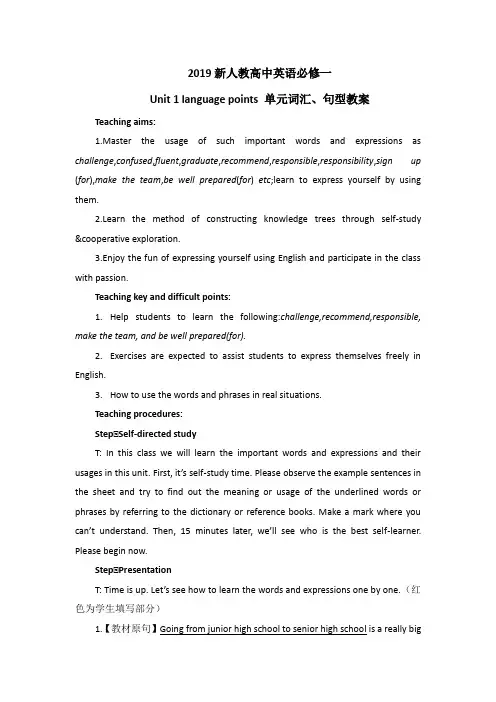
2019新人教高中英语必修一Unit 1 language points 单元词汇、句型教案Teaching aims:1.Master the usage of such important words and expressions as challenge,confused,fluent,graduate,recommend,responsible,responsibility,sign up (for),make the team,be well prepared(for) etc;learn to express yourself by using them.2.Learn the method of constructing knowledge trees through self-study &cooperative exploration.3.Enjoy the fun of expressing yourself using English and participate in the class with passion.Teaching key and difficult points:1.Help students to learn the following:challenge,recommend,responsible, make the team, and be well prepared(for).2.Exercises are expected to assist students to express themselves freely in English.3.How to use the words and phrases in real situations.Teaching procedures:StepⅠSelf-directed studyT: In this class we will learn the important words and expressions and their usages in this unit. First, it’s self-study time. Please observe the example sentences in the sheet and try to find out the meaning or usage of the underlined words or phrases by referring to the dictionary or reference books. Make a mark where you can’t understand. Then, 15 minutes later, we’ll see who is the best self-learner. Please begin now.StepⅠPresentationT: Time is up. Let’s see how to learn the words and expressions one by one.(红色为学生填写部分)1.【教材原句】Going from junior high school to senior high school is a really bigchallenge.从初中过渡到高中真是一项巨大的挑战。
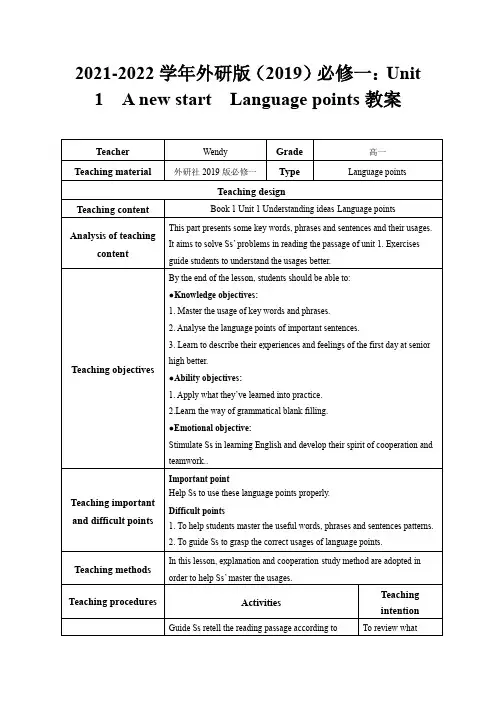

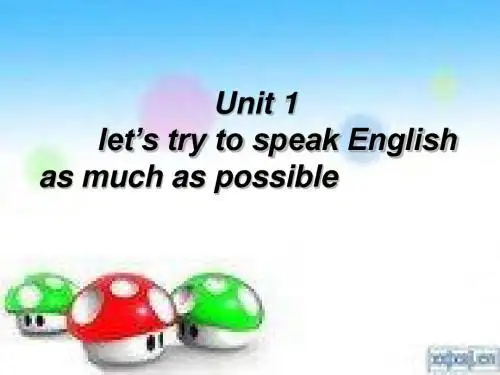
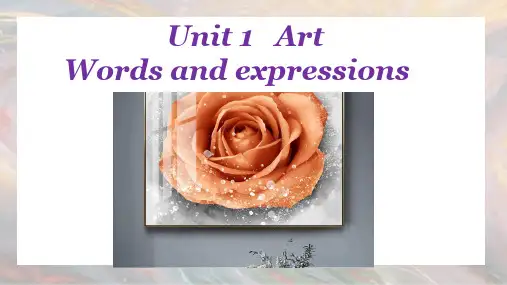
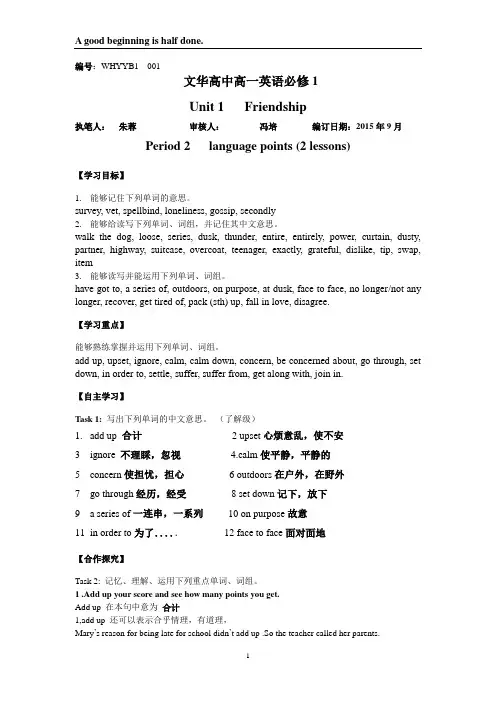
编号:WHYYB1---001文华高中高一英语必修1Unit 1 Friendship执笔人:朱蓉审核人:冯培编订日期:2015年9月Period 2 language points (2 lessons)【学习目标】1.能够记住下列单词的意思。
survey, vet, spellbind, loneliness, gossip, secondly2.能够给读写下列单词、词组,并记住其中文意思。
walk the dog, loose, series, dusk, thunder, entire, entirely, power, curtain, dusty, partner, highway, suitcase, overcoat, teenager, exactly, grateful, dislike, tip, swap, item3.能够读写并能运用下列单词、词组。
have got to, a series of, outdoors, on purpose, at dusk, face to face, no longer/not any longer, recover, get tired of, pack (sth) up, fall in love, disagree.【学习重点】能够熟练掌握并运用下列单词、词组。
add up, upset, ignore, calm, calm down, concern, be concerned about, go through, set down, in order to, settle, suffer, suffer from, get along with, join in.【自主学习】Task 1:写出下列单词的中文意思。
(了解级)1.add up 合计 2 upset心烦意乱,使不安3ignore 不理睬,忽视 4.calm使平静,平静的5concern使担忧,担心 6 outdoors在户外,在野外7go through经历,经受8 set down记下,放下9 a series of一连串,一系列10 on purpose故意11in order to为了.....12 face to face面对面地【合作探究】Task 2: 记忆、理解、运用下列重点单词、词组。

Unit 1 Stay Healthy Lesson 1: What’s Wrong, Danny?stomach, regret, fever, pale, Sara, examination, pain, X-rayII. Learning important and difficult points:1) Danny wakes up his parents.2) I regret eating so many donuts now.3) Need we go there right now?4) She takes them to a small examination room.5) Danny needs to stay in the hospital today.Language Points:1. regret【用法】作及物动词,意为“对……感到后悔”,后加名词、代词、动名词作宾语。
【举例】①Tony has been regretting that matter. 托尼对那件事情一直感到很后悔。
②I regret making such a foolish decision. 我后悔做出这么愚蠢的决定。
【用法】作不可数名词,意为“遗憾、惋惜”。
【举例】His great regret is not seeing his father for the last time. 他最大的遗憾是没有能最后一次见他父亲一面。
2. Danny wakes up his parents. 丹尼把他的父母叫醒了。
【用法】短语wake up意为“叫醒”,这是“动词+副词”短语。
这类短语用名词作宾语时,名词可在副词前,也可用在副词后;如用代词作宾语时,代词则必须用在副词前。
故这句话中的wake up his parents 还可说为wake his parents up。
【举例】Mum, will you please wake me up at five tomorrow morning? 妈妈,你能在明天早晨五点钟叫醒我吗?【拓展】wake up也可不带宾语,意为“醒来”。
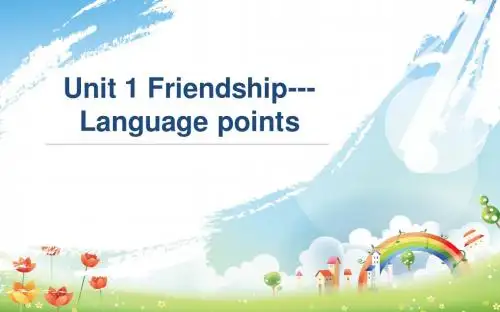
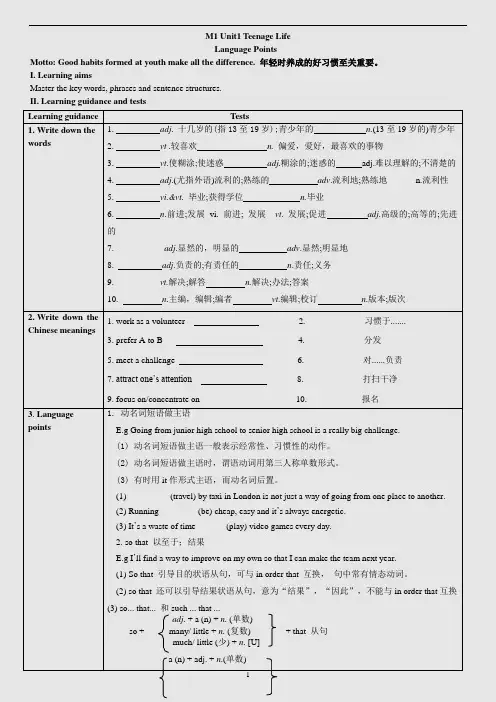
M1 Unit1 Teenage LifeLanguage PointsMotto: Good habits formed at youth make all the difference. 年轻时养成的好习惯至关重要。
I. Learning aimsMaster the key words, phrases and sentence structures.II. Learning guidance and testsLearning guidance Tests1.Write down the words 1.adj. 十几岁的(指13至19岁);青少年的n.(13至19岁的)青少年2.vt .较喜欢n.偏爱,爱好,最喜欢的事物3.vt.使糊涂;使迷惑adj.糊涂的;迷惑的adj.难以理解的;不清楚的4.adj.(尤指外语)流利的;熟练的adv.流利地;熟练地______ n.流利性5.vi.&vt. 毕业;获得学位n.毕业6.n.前进;发展vi. 前进; 发展vt. 发展;促进adj.高级的;高等的;先进的7. ___________adj.显然的,明显的adv.显然;明显地8. adj.负责的;有责任的n.责任;义务9. __________vt.解决;解答n.解决;办法;答案10. n.主编,编辑;编者vt.编辑;校订n.版本;版次2.Write down theChinese meanings1. work as a volunteer2. _____________习惯于.......3. prefer A to B4. _____________分发5. meet a challenge6. _____________对......负责7. attract one’s attention 8. _____________打扫干净9. focus on/concentrate on______________ 10. ____________报名3. Language points 1. 动名词短语做主语E.g Going from junior high school to senior high school is a really big challenge.(1) 动名词短语做主语一般表示经常性、习惯性的动作。
![Unit 1 Language points[课件]](https://uimg.taocdn.com/67d20b6825c52cc58bd6beb4.webp)
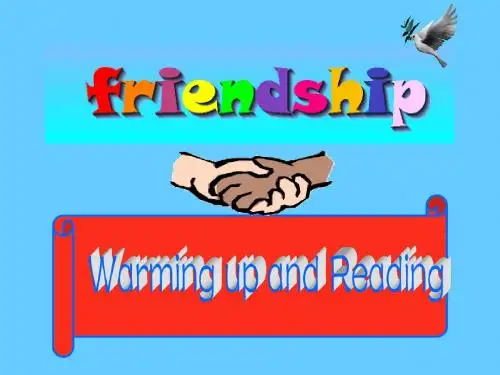
Unit 1Language points:1. They have been tripping over chairs, walking into doors, and falling down on stage for year.这些演员多年来玩的把戏有:被椅子绊倒,撞到房门,或是跌倒在舞台上。
trip vi./vt. 绊倒,绊( tripped, tripped) trip over sth. 被某物绊倒了,也可以用作trip on sth.1) The old man tripped and fell.那个老人绊倒了。
2)A wise man should not trip over / on the same stone.聪明人不应该犯同样的错误。
(聪明人不应该被同一块石头绊倒。
)2. Only a few stand-up comedians have become famous as television and film actors later on in life.只有为数不多的单口喜剧演员在随后的生涯中成为走红的影视明星。
later on 后来,过些时候1) I’ll tell you all about it later on.过些时候我会把这一切都告诉你。
2) The radio says that the clouds will lift later on.广播里说云稍后会散去。
3. One such person is Billy crystal.一个成功的例子就是比利·克里斯托。
one such person表示“这样一个人”。
such 表示“这样的,那样的,如此的”,作形容词,用于修饰名词,常用于下列几种结构。
1)“one, all, no,等+ such + 名词”。
一张这样的桌子就够了。
One such table is enough.所有这些可能性都必须考虑到。
高一英语必修一教案:Unit1以下是作者为大家整理的关于《高一英语必修一教案:Unit1》,供大家学习参考!Teaching aims:1. 能力目标:a. Listening: get information and views from thelistening material;b. Speaking: express one’s attitude or views aboutfriends and friendship in appropriate words.c. Reading: enable the Ss to get the main idead. Writing: write some advice about making friend as an editor2. 知识目标:a. Talk about friends and friendship; how to make friends; how to maintain friendshipb. Use the following expressions:I think so. / I don’t think so.I agree. / I don’t agree.That’s correct.Of course not.Exactly.I’m afraid not.c. to enable the Ss to control direct speech and indirect speechd. vocabulary: add point upset calm concern careless loose cheat reason list share feeling thought German series outdoors crazy moonlight purpose dare thunder entirely power according trust indoors suffer teenager advice quiz editor communicate situation habitadd up calm down have got to be concerned about walk the dog go through hide away set down a series of on purpose in order to face to face according to get along with fall in love join in3. 情感目标:a. To arose Ss’ interest in learning English;b. To encourage Ss to be active in the activities and make Ss to be confident;c. To develop the ability to cooperate with others.4. 策略目标:a. To develop Ss’ cognitive strategy: taking notes while listening;b. To develop Ss’ communicative strategies.5. 文化目标:to enable the Ss to get to know different opinions about making friends from different countries.Teaching steps:Period oneStep1. Warm-up1. Ss listen to an English song AULD LANG SYNE.2. Brainstorming: let Ss say some words about friendship– honest, friendly, brave, humorous, funny, wise, kind, open-minded, responsible, helpful….Step 2. Talk about your old friends1. Ss talk about their old friends in Junior Middle School, talk about their appearance, personality, hobbies, etc.2. Self-introductionStep 3. Make new friends1. Ss go around and ask their new friends someinformation and fill in the following formName Age/hobbies/favorite sports, books, …2. Report to the class: who will probably be your friend why.Step 4. Do a surveySs do the survey in the text ,P1Sep 5. Listening and talkingDo Wb P41 (Talking). While Ss listen to the material, ask them to take notes about the speaker’s views of making friends.When Ss make their conversation, ask them to try to usethe following expressions.I think so. / I don’t think so. I agree. / I don’t agree.That’s correct. Of course not. Exactly. I’m afrai d not.Step 6. DiscussionDivide Ss four in one group and each group choose a topic to discuss. There are four topics.Topic 1: Why do you need friends? Make a list of reasons why friends are important to you.Topic 2: There is a saying “to have a good friend, you need to be a good friend.” What do you think of the saying and how can you be a good friend?Topic 3: Does a friend always have to be a person? What else can be your friend? Why?Topic 4: List some qualities of a person who does not make friend easily.Step 7. Summary1. Ask Ss themselves to summarize what is friendship and what is the most important in making friends.2. T shows more information about friendship and a poem about friendship.What is friendship?I want to find the answer to the questionWhat is friendship?When it rains, I think friendship is a small umbrella.It can give me a piece of clear sky.When I’m crying, I think friendship is a white handkerchief.It can wipe my tears dry.When I am sad, I think friendship is a warm word.It can bring me happiness again.When I am in trouble, I think friendship is a strong hand.It can help me escape my troubles.When I sit in a quiet place, I think friendship is a very wonderful feeling.It can’t be pulled and torn, because it is inevery one’s heart.It is there from the beginning to the end of our lives.3. Tell Ss: make new friends and keep the old; one issilver and the other is gold.Step 8. EvaluationSs finish the following evaluation form. Standard: A, B,CContents 自评他评1. I’m acti ve in talking with others.2. I’m active in cooperating with others.3.I can express myself fluently, accurately and appropriately.4. I know more about friendship after this lesson..5. Do you think you need to improve yourself in some aspects? Which aspects?Homework:1. Look up the new words and expressions in warm-up and pre-reading in a dictionary.2. Write a short passage about your best friend.Period twoStep1.Warming upActivity1: Suppose you have to stay indoors to hide yourself for a whole year. You can never go outdoors, otherwise you will be killed. You have no telephone, computer, or Tv at home.How would you feel?What would you do?Four students a group discuss with each other for 2 minutes.Activity2: Play a short part of the movies Schindler’s ListStep2. PredictingStudents read the title of the passage and observe the pictures and the outline of it to guess:Who is Anne’s best friend?What will happen in the passage?Step3. SkimmingStudents skim the passage in 2 minutes to get the main idea :Who is Anne’s best friend?When did the story happen?Step4. ScanningStudents work in pairs to find the information required below:Annein World War ⅡStep5. Intensive readingStudents work in group of four to discuss the following open questions:1.Why did the windows stay closed?2.How did Anne feel?3.What do you think of Anne?4.Guess the meanings of “spellbound”, “ hold me entirely in their power” from the discourse(语篇,上下文).5.Which sentences attract you in the passage? Step6. ActivityFour students a group to discuss the situation:Suppose you four have to hide yourselves for 3 months. During the three months, you will be offered the basic food, water and clothes. Your group can take 5 things with you.What will you take? Why?How will you spend the 3 months?How will you treat each other and make friends ?Step7.AssignmentTask1.Surf the internet to find Anne’s Diary and read some of it. Print out a piece of the diary and write down your feelings after reading it on the page. We will share the pieces and your feelings with the whole class.Task2.Ex2.3on Page3Period threeStep 1. Warming upCheck the Ss’ assignment: task 2Step 2. Language points:1. add (v.)1). To put together with something else so as to increase the number, size, importance, etc.增加,添加Please add something to what I’ve said, John.2). To join numbers, amount, etc so as to find the total 相加Add up these figures for me, please.add to something: to increase 增加What he did has added to out difficulties.add up to: to amount to 加起来等于;总计The cost added up to 100 million yuan.2. cheat v. 1). To act in a dishonest way in order to win 敲诈;作弊2). (of, out of) to take from (someone) in a dishonest way 欺骗They cheated the old woman out of her money by making her sign a document she didn’t understand.n. 1). an act of cheating 作弊行动2). one who cheats 骗子3. go through1). To examine carefully 仔细浏览或研究I went through the students’ papers last night.2). To experience 经历,遭受或忍受You really don’t know what we went through while working on this project.4. crazy (adj.)1). mad, foolish 疯狂的,笨拙的It’s crazy to go out in such hot weather.2). wildly excited; very interested 狂热的,着迷的She is crazy about dancing.5. lonely (adj.) unhappy because of being alone or without friends 孤独的,孤寂的He has been very lonely since his wife left him.lonely/alonealone1). without or separated from others 单独的She lives alone.2). only 仅仅,只有。